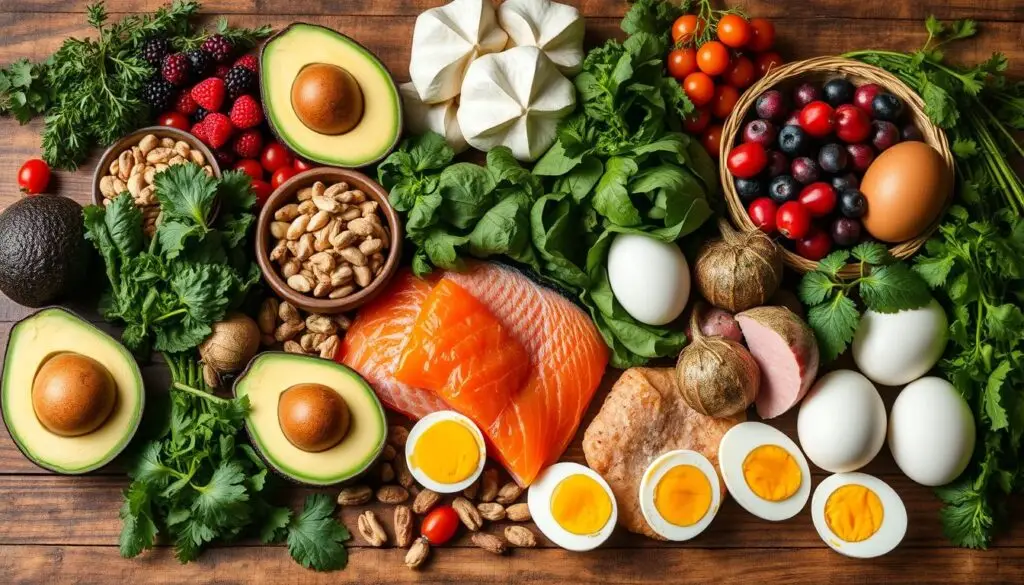Ever felt a “keto energy dip”? It’s that tired feeling some get on a low-carb diet. But, you can beat it with the right tips. Studies show over 50% of keto dieters feel more energetic after trying these tips.
These Keto tips for improving energy level will explain the keto energy dip and its symptoms. We’ll share tips to boost your energy and feel great on the keto diet. Say goodbye to midday slumps and stay focused all day.
Pair these tips with the Keto beginner’s guide and boost fat loss with our weight loss science article.
Key Takeaways
- The ketogenic diet can initially cause a temporary energy dip, but with the right approach, you can overcome it and experience increased energy levels.
- Understanding the science behind ketone energy production and common keto adaptation symptoms is key to managing your energy effectively.
- Optimizing your electrolyte intake, meal timing, and exercise routine can significantly boost your energy on the keto diet.
- Choosing the right foods and supplements, as well as managing stress and sleep, are essential for maintaining high energy levels.
- Avoiding common keto energy-draining mistakes, such as hidden carb sources and portion control issues, can help you maintain consistent energy throughout your keto journey.
Understanding the Keto Energy Dip: Why It Happens and What to Expect
Starting the keto diet is exciting, but you might feel tired at first. This is normal as your body learns to use fat and ketones for energy. Knowing why and when this happens can help you stay energized.
Common Symptoms of Keto Adaptation
When you start keto, you might feel tired, hungry, or have trouble focusing. You could also get headaches or feel dizzy. These feelings usually happen in the first few weeks as your body gets better at using fat for energy.
Timeline of Energy Changes on Keto
It takes a few weeks to get used to keto. Here’s what you might feel:
- First, you might feel really tired (1-2 weeks). This is because your body is switching to using ketones for energy.
- Then, you’ll start to feel better (2-4 weeks). Your body gets better at making and using ketones, so you’ll have more energy.
- After that, you’ll feel great (4-8 weeks). Your body is fully adapted to keto, and you’ll have lots of energy and focus.
The Science Behind Ketone Energy Production
The keto diet makes your body use fat and ketones for energy. Ketones are a great energy source for your brain and body. As you get used to keto, you’ll have more energy and focus.
Essential Electrolytes: Your Key to Sustained Energy on Keto
Keeping the right electrolyte balance is key on a keto diet. Electrolytes like sodium, potassium, and magnesium help make energy. Without them, you might feel tired, get muscle cramps, or have headaches.
When you start a keto diet, your body changes how it uses energy. It starts burning fat instead of carbs. This change can make your body lose more sodium and potassium. It’s important to add these electrolyte back to keep your energy up and help your body adjust.
| Electrolyte | Function | Keto-Friendly Food Sources |
|---|---|---|
| Sodium | Regulates fluid balance, nerve and muscle function | Bone broth, salty meats, pickles, olives |
| Potassium | Supports muscle and nerve function, heart health | Leafy greens, avocados, nuts, seeds |
| Magnesium | Involved in energy production, muscle and nerve function | Spinach, almonds, dark chocolate, pumpkin seeds |
Focus on staying hydrated and eat foods rich in electrolytes on your keto diet. This helps keep your energy high and supports your health. A balanced approach to electrolytes is crucial for a successful keto journey.
Keto Tips for Improving Energy Level: Proven Strategies That Work
Keeping your energy up on a keto diet can be tough. But, with the right tips, you can beat energy lows. You’ll stay sharp and full of energy all day. We’ll share easy ways to boost your morning, plan meals, and exercise to keep your energy up.
Morning Routine Optimization
Begin your day with habits that boost your energy and brain. Add these morning steps to your routine:
- Drink water or an electrolyte drink as soon as you wake up. It helps replace lost fluids and salts.
- Do some light exercise or meditate to get your blood flowing and focus sharp.
- Eat a keto-friendly breakfast that’s full of nutrients. It gives you energy for the day.
Strategic Meal Timing
Plan your meals to keep your energy up on keto. Here are some tips:
- Eat meals at regular times to keep your energy steady from ketones.
- Have carb-rich snacks or meals around your exercise routine. They fuel your workouts and refill glycogen.
- Try intermittent or extended fasting to burn fat better and stay mentally clear.
Exercise Integration Tips
Adding exercise to your keto life boosts your energy. Follow these tips:
- Choose exercises you like, like strength training, cardio, or LISS. It makes working out a habit.
- Work out when you have the most energy, usually in the morning or early afternoon.
- Change how hard and long you exercise based on how your body adapts to keto. This avoids getting too tired.
By improving your morning, planning meals, and adding exercise, you can get the most from keto. You’ll have more energy, stay sharp, and feel great all day.
Smart Food Choices to Boost Your Keto Energy Levels
Eating the right keto-friendly foods is important for energy on the keto diet. Choose foods rich in healthy fats. This helps your body make and use ketones for energy.
Here are some top keto-friendly foods for more energy:
- Avocados: Full of healthy fats, fiber, and vitamins, avocados help keep blood sugar stable and give lasting energy.
- Nuts and seeds: Almonds, walnuts, chia, and flaxseeds are packed with healthy fats. They make great snacks for a quick energy boost.
- Fatty fish: Salmon, mackerel, and sardines have omega-3s. These fats reduce inflammation and boost brain function.
- Leafy greens: Spinach, kale, and other greens are low in carbs but full of vitamins and minerals. They fuel your body well.
- Coconut oil: This healthy fat is great for cooking, baking, or adding to coffee or smoothies. It gives a steady energy lift.
| Keto-Friendly Food | Nutrient Profile | Energy-Boosting Benefits |
|---|---|---|
| Avocado | High in monounsaturated fats, fiber, vitamins, and minerals | Stabilizes blood sugar, provides long-lasting energy |
| Nuts and seeds | Rich in healthy fats, protein, and fiber | Portable, energy-boosting snack option |
| Fatty fish | High in omega-3 fatty acids | Reduces inflammation, supports cognitive function |
| Leafy greens | Nutrient-dense, low in carbs | Provides essential vitamins, minerals, and antioxidants |
| Coconut oil | Rich in medium-chain triglycerides (MCTs) | Offers a sustained energy boost |
Adding these keto-friendly foods to your diet helps keep your energy steady. They support your health on the ketogenic diet.

Hydration and Supplements: Supporting Your Keto Journey
Keeping up with micronutrient intake and hydration levels is key. It helps keep your energy up and your body healthy on the keto diet. Here are some important tips to help you stay fueled and feeling great.
Water Intake Guidelines
Drinking enough water is vital for your energy and brain work. When you start keto, your body needs more water and salts. Try to drink at least 8 glasses (64 oz) of water a day. Drink more if you’re active or it’s hot outside to replace lost water.
Essential Supplement Recommendations
- Magnesium: Helps with energy and muscle work.
- Potassium: Keeps nerves and muscles working right, avoiding cramps and tiredness.
- Sodium: Keeps fluids balanced and helps your adrenal glands.
- Omega-3s: Lower inflammation and are good for your brain.
- Exogenous Ketones: Give you energy when you’re feeling the keto flu.
Natural Energy Boosters
There are also natural ways to boost your energy on keto:
- Matcha green tea for a gentle caffeine kick and antioxidants.
- Adaptogenic herbs like ashwagandha and rhodiola to fight stress.
- MCT oil for quick energy from fats.
Focus on hydration and smart supplements. This will make your keto journey smoother and keep your energy up.
Sleep and Stress Management on the Keto Diet
Keeping your energy up on the keto diet is not just about food and exercise. Getting good sleep and managing stress are key too.
When you start the keto diet, your body changes a lot. It starts burning fat instead of carbs. This can mess with your sleep, making you tired and low on energy. So, it’s important to focus on quality sleep and stick to a bedtime routine.
- Try to sleep for 7-9 hours each night. This helps you rest well.
- Make your bedroom cool, dark, and quiet. This helps you sleep better.
- Try relaxation methods like meditation or deep breathing before bed. They help you sleep better.
Managing stress is also key to keeping your energy up on the keto diet. The diet can be hard on your mind and body, making you stressed. Here are some ways to handle stress:
- Do things that help you relax, like yoga, journaling, or being in nature.
- Exercise regularly. It helps with stress and boosts your energy.
- Take care of yourself. Take breaks, spend time with loved ones, and do things you enjoy.
| Sleep Recommendation | Stress Management Technique |
|---|---|
| 7-9 hours of quality sleep per night | Yoga, journaling, spending time in nature |
| Consistent sleep routine | Regular exercise |
| Relaxation techniques before bedtime | Prioritizing self-care activities |
By focusing on quality sleep and managing stress well, you can keep your energy up. This helps you do well on the keto diet.

“Adequate sleep and stress management are just as important as your diet and exercise routine when it comes to maintaining high energy levels on the keto diet.”
Common Energy-Draining Mistakes to Avoid on Keto
Starting a low-carb diet like keto can make you feel more energetic. But, even the most careful keto followers can make mistakes. These mistakes can hurt their sustained energy. Let’s look at three big mistakes to avoid for better energy on keto.
Hidden Carb Sources
Many people feel tired on keto because of hidden carbs. Things like condiments, sauces, and some low-carb foods can sneak up on you. They can pull you out of ketosis and make you feel weak. Always check labels and watch your carb count to stay away from these sneaky carbs.
Portion Control Issues
Getting the right mix of nutrients is key for energy on keto. It’s easy to cut down on carbs, but controlling fats and proteins can be hard. Eating too much or too little of these can mess up your energy. Paying attention to how much you eat and listening to your body can help you find the right balance.
Timing Mishaps
When and what you eat can also affect your energy. Skipping meals or fasting without planning can make you feel tired. Plan your eating times and listen to your body to keep your energy up.
Avoiding these mistakes can make your keto journey better. Stay alert, listen to your body, and adjust as needed. This way, you can reach your energy goals on keto.
Conclusion
Improving your energy on a ketogenic diet is possible. We’ve shared key strategies to help you. These include understanding keto energy dips, mastering electrolytes, and optimizing your routines.
Every person’s keto journey is different. Be patient and try new things to find what works for you. Celebrate your small wins and stay focused on your health goals.
With these tips, you’re ready to feel and perform better. You’re on your way to thriving on a ketogenic diet. Go for it!
FAQ
What are the most common symptoms of the keto energy dip?
How long does the keto energy transition typically last?
Why is electrolyte balance important for maintaining energy on keto?
What are some effective morning routine strategies for boosting keto energy?
How can I choose keto-friendly foods to support my energy levels?
What supplements can help enhance energy on the keto diet?
How does sleep and stress management impact energy levels on keto?
What are some common energy-draining mistakes to avoid on the keto diet?

I’ve followed a low-carb and ketogenic lifestyle for over five years, gaining hands-on experience with what is practical, sustainable, and realistic in daily life. My work is informed by continuous self-education through reputable nutrition research and publicly available medical literature.
Read more about the founder →



